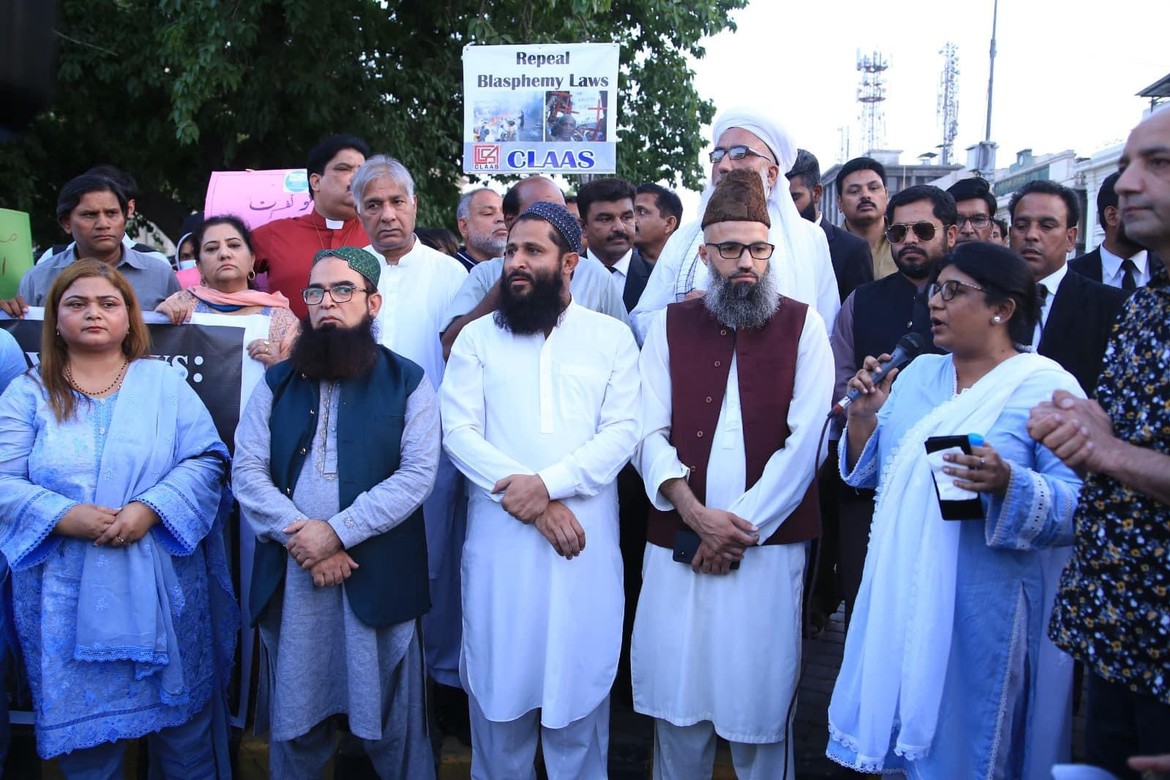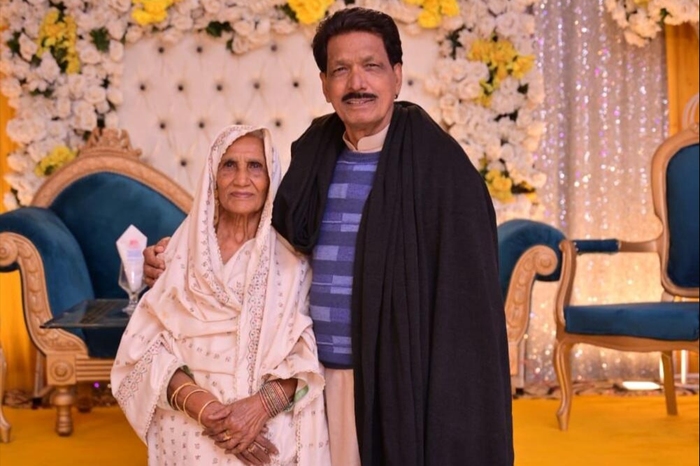We must confront both Islamic and Christian extremism
Confronting extremism and violence in Islam will be more credible if it also addresses the extremist misuse of Christianity.

Muslim teachers took part in a demonstration against the misuse of the blasphemy law as the Human Friends Organisation (HFO) gathered church and civil society leaders in Lahore on 8 June. On the far right is Sajid Christopher of the HFO. Photo: HFO
Originally published 06.28.24, as an Op-Ed in the Norwegian Christian newspaper Dagen by Johannes Morken, Editor at Stefanus Alliance. Photos: HFO
A new tragic attack has struck a Christian neighbourhood in Pakistan. A Christian shoemaker in Sargodha accidentally set fire to a Quran that had blown onto his property during a storm, along with other paper waste. The neighbour refused to accept an apology. He accused Masih of blasphemy and called in his extremist friends from the TLP party. Nazir Masih was lynched. The family are forced to live at a secret address. The ordeal was so overwhelming for his widow, Allah Rakha, that she died from the trauma.
This time the police managed to prevent the entire neighbourhood from being burnt down, unlike last August when they failed and 90 houses and nearly 25 churches were burnt down in Jaranwala. What gives hope is that the churches and houses in Jaranwala have been rebuilt with public aid.
What gives no hope is the failure of the police to track down the culprits. Extremists, with their divine death threats, unfortunately have a stronghold on the lower echelons of the police and judiciary. Since the government has accepted the TLP as a political party and not a terrorist organisation, the extremists are allowed to mobilise in mosques and the media.
Pakistan's blasphemy laws, which carry the death penalty, are a curse for the country's religious minorities. With each attack, fear grows in the small Christian community, which is disproportionately targeted. Hindus, Sikhs and Ahmadis are also targeted.
At the same time, it is important to know: Of the 329 people formally or informally accused of violating the blasphemy laws last year, three out of four were Muslims. Half of them were Shia Muslims, who are under severe pressure in a Sunni-dominated country.
Sunni Muslim lynched
Just a month after the killing of Nazir Masih, a Sunni Muslim man was lynched in the northwestern Swat Valley. The extremists also accused him of desecrating the Koran. When the police refused to hand over the arrested man, the mob broke into the police station. The man accused of blasphemy was beaten to death. His body and the police station were set on fire.
Unfortunately, false accusations of blasphemy against innocent people go unpunished. No one has ever been executed after being sentenced to death. But in the last 30 years, at least 96 people have been killed by extremists after being accused of blasphemy.
Radical and violent Islam is a scourge on many countries. The brutality of ISIS has forced some Islamic scholars to confront dangerous interpretations of the Koran. But many still have a long way to go before they sufficiently address Quranic verses that inspire violence and the dangerous misuse of blasphemy laws. It is not credible to say that 'this has nothing to do with Islam.
No one has ever been executed after being sentenced to death. But in the past 30 years, at least 96 people have been killed by extremists after being accused of blasphemy.

Nazir Masih, 73, was lynched by extremists who accused him of blasphemy. His widow, Allah Rakha, died a few days later, probably from the trauma of the attack. Photo:HFO
Brave Muslims
On the other hand, we must appreciate those Muslims who dare to stand with the victims. In Jaranwala, Pakistan, last year, Muslim neighbours helped terrified Christians escape when the mob was on its way. There are lawyers and Supreme Court judges who stand up to extremists.
Our African partner, Procmura, sees it as a Christian calling to work for better relations between Christians and Muslims, as in Nigeria. Using our materials, they have trained people to teach others about religious freedom as a right for all.
In an orphanage in the southern part of Kaduna state, there are children who have lost their parents in a bloody conflict over grazing land and farmland. A heavily armed Islamist militia from the otherwise peaceful Fulani herdsmen community is behind many of the killings.
Most of the orphans at the orphanage are Christians. A team from Procmura - both Christians and Muslims - brought aid packages. During the visit, Christian children dared to hold hands with Muslim children for the first time. They understood that not all Muslims are out to kill Christians.
During the visit, Christian children dared to hold hands with Muslim children for the first time. They understood that not all Muslims are out to kill Christians.
Kirill's extremism
But religious extremism is not only Islamic. In India, Muslims - along with Christians - are persecuted by Hindu nationalist extremists. In Myanmar, extreme Buddhist monks incite hatred against Muslims and Christians.
Christians are not free from temptation either. The Russian Orthodox Patriarch Kirill has declared the attack on Ukraine a 'holy war' and 'promised' a place in heaven to soldiers who die. His ideology of martyrdom is essentially the same as that of ISIS.
In 2014, Putin's attack on Ukraine began, legitimised by ecclesiastical extremism. In August of the same year, ISIS attempted to exterminate the Yazidis in Iraq and then drove Christians out of Mosul and the Nineveh Plain under threat of death. Ten years later, it is time for more confrontation with religious extremism that legitimises war and terror.
Apocalyptic killings
Our African partner, Procmura, knows a lot about Islamist terror in Africa. Recently, Procmura has been deeply involved in another tragedy. A Christian pastor in Shakahola, Kenya, is accused of murder, including the deaths of children. He manipulated church or cult members into starving themselves to death in a horrific and misguided expectation of the end times.
Church leaders now realise that they must hold each other accountable to stop extremists and charlatans. It is too easy to manipulate the poor into dangerous leader worship and extreme actions. It is too easy to say that this has nothing to do with Christianity.
There must be strong safeguards for theology and leadership to prevent Christianity being used for extremism and abuse.
There is every reason to fight Islamic, Hindu nationalist and Buddhist extremism. But that fight will be more credible if there is also a clear confrontation with the extremist misuse of Christian faith and thought.